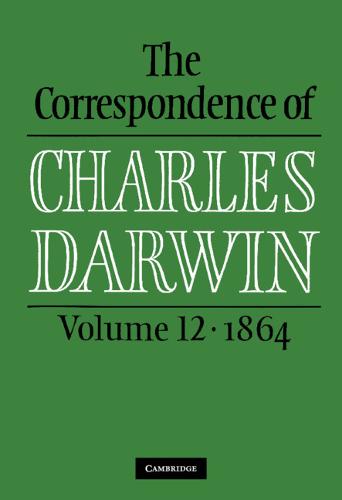
The twelfth volume of Charles Darwin’s correspondence comprises all the surviving letters both from and to Darwin from the year 1864.
As in the previous year, Darwin suffered much ill-heath during 1864, so progress on the first volume of his planned ‘big book’ on species was delayed for several more months. Instead, Darwin once again dedicated what energy he could muster to less strenuous botanical studies, all of which sought to support arguments he had presented to the world five years earlier in On the Origin of Species. He continued his investigations into heterostyly and plant hybridisation, but focused in particular on climbing plants. All of these studies investigated how existing plant organs had become modified, producing adaptations that encouraged cross-pollination, or that enabled plants to climb.
Also of note in 1864 was Darwin’s developing friendship with the man who had independently arrived at the idea of natural selection, Alfred Russel Wallace. Darwin was particularly impressed with Wallace’s paper The Origin of Human Races and the Antiquity of Man Deduced from the Theory of “Natural Selection”, which was the first to apply the idea of natural selection to human evolution. Although Darwin had ideas of his own on the subject, and did not agree with everything Wallace had to say, Wallace’s emphasis on the evolution of human morality and intellect provided an interesting new slant that was later to inform Darwin’s The Descent of Man. Indeed, so impressed was Darwin with the paper that he offered to give Wallace his own notes on human evolution, should Wallace decide to write further on the topic. Darwin was also impressed with Wallace’s modesty at not taking any credit for the theory of natural selection: ‘it is just as much yours as mine’, he admonished Wallace. ‘I shall always maintain it to be actually yours & your’s only’, replied Wallace by return of post.
1864 was also the year in which Darwin was finally awarded the Royal Society’s most prestigious honour, the Copley Medal, having pointedly been passed over for the same award the previous year. But the honour sparked controversy with Darwin’s supporters when it emerged that his evolutionary work had not been taken into consideration in his selection for the award.
Other highlights featuring in Darwin’s 1864 correspondence include:
- a moving death-bed tribute to Darwin from botanist Francis Boott, conveyed to Darwin by Boot’s widow, Mary;
- Darwin receiving an apology from Daniel Oliver, Assistant in the herbarium of the Royal Botanic Gardens, Kew, for having addressed Darwin as if he were one of his students; and Darwin’s typically modest response that he prefers ‘being treated as what I am[:] quite ignorant of the rudiments of botany’;
- Darwin trying to find a new placement for gardener/botanist John Scott, who had resigned from his post at the Royal Botanic Garden, Edinburgh, frustrated at lack of support from his superiors. Darwin ends up paying for Scott’s passage to India;
- Darwin’s former shipmate aboard HMS Beagle Bartholomew Sulivan informing Darwin of the recent deaths of two other shipmates;
- the poorly Darwin reporting having being read an astounding number of ‘trashy novels’;
- Darwin’s and his correspondents’ reactions to the first photograph of him sporting a beard. ‘Do I not look venerable?’ he jokes. His best friend, Joseph Dalton Hooker, compares the bearded Darwin to a painting of Moses in the House of Lords;
- Darwin explaining the origin and development of his theory of evolution by means of natural selection to a new German disciple, Ernst Haeckel;
- Darwin receiving (and apparently wisely ignoring) a ridiculously long, rambling letter from a religious fundamentalist who, while admitting he has not actually read On the Origin of Species, feels duty bound to point out the error of Darwin’s ways by quoting biblical chapter and verse, and by using different-coloured inks and occasional capital letters. (I share your pain, Mr D: believe me, I’ve been there!)
As with all the volumes in this series, this book is really aimed at people with a serious interest in Charles Darwin. As with all the other volumes, every letter is annotated with meticulously researched footnotes explaining its context and references. The series as a whole is a masterpiece of scholarship.
- Buy this book from Bookshop.org (UK) and help tax-paying, independent bookshops.
- Buy this book from Amazon.co.uk
- Buy this book from Amazon.com